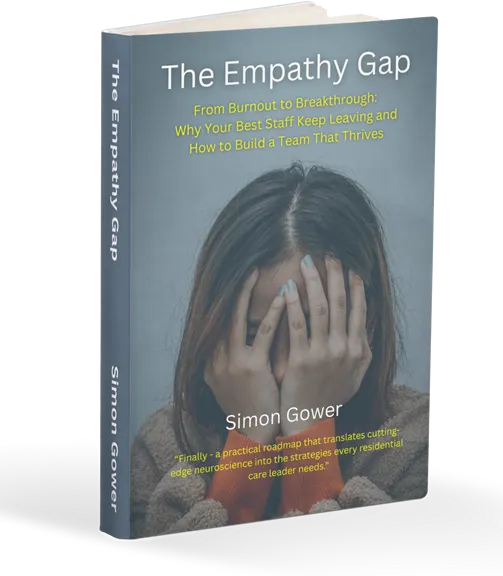The Empathy Gap

What if the challenges in residential childcare aren't about knowledge, but about biology?
In The Empathy Gap, Simon Gower presents a groundbreaking exploration of why even the most dedicated residential childcare professionals struggle to maintain consistent trauma-informed practice, and more importantly, what you can do about it.
Beyond Training to Transformation
"We've spent years training Teams to be trauma-informed about the children. Now we need to be trauma-informed about the Team"
Drawing on cutting-edge neuroscience, attachment theory, and the lived experience of residential childcare professionals across the UK, this book reveals how workplace stress systematically undermines the very qualities that traumatised young people need most: empathy, presence, and co-regulation.
Join the waiting list and receive a sneak preview...
Bridging the Gap Between Knowledge and Practice
You know what trauma-responsive care should look like. Your team has attended the trainings. You've read the research. Yet in the daily reality of residential childcare, implementing these approaches consistently remains frustratingly elusive. The problem isn't knowledge.
The problem is that very few organisations have effectively addressed how workplace stress systematically undermines adult's neurobiological capacity to provide the care young people desperately need.
The Empathy Gap reveals the missing link in trauma-responsive care: how chronic workplace stress impacts your team's regulation, depletes empathic capacity, and creates conditions where even the most dedicated professionals struggle to maintain the connection that traumatised young people require for healing.
Discover Why:
Teams can explain trauma theory perfectly but struggle to implement it during crisis
Young people with trauma histories can detect adult dysregulation despite professional facade
Traditional approaches to "professional detachment" often harm rather than help
Organisational systems frequently undermine the regulatory capacity essential for quality care
The most powerful factor in young people's healing isn't techniques but relationship
A Practical Roadmap for Transformation
What You'll Discover
The Empathy Gap doesn't just diagnose problems, it offers a comprehensive framework for creating genuinely trauma-responsive residential care, including:
A neurobiological framework for understanding how workplace stress affects team's capacity to provide trauma-responsive care
How stress hormones impair empathy: Cortisol and stress activation disrupt prefrontal function, suppress oxytocin, overstimulate the threat-detection system, and trigger protective emotional numbing in brain regions essential for empathic connection.
Evidence-based strategies for building regulatory capacity at individual, team and organisational levels
The RIPPLE Framework™ - a developmental model for sustainable implementation - Practical approaches to redesigning residential care systems to support rather than undermine adults regulatory capacity
Design principles for creating environments where trauma-informed care becomes neurobiologically possible
The Developmental Guide™ - A new vision of the residential childcare professional
The SAFE Framework™ - Trauma-Informed Supervision, evidence-based approaches to supervision that support rather than deplete teams
Real-world examples of organisations that have successfully bridged the empathy gap, with measurable improvements in both young people's outcomes and staff wellbeing
For Everyone Who Cares About Quality Residential Childcare
Whether you're a frontline practitioner, team leader, registered manager, responsible individual, service/operations manager, commissioner, or regulator, this book provides the understanding and tools needed to transform residential childcare from merely managing behaviour to supporting genuine development and recovery.
Why This Book Is Different
Unlike most trauma-informed care resources that focus primarily on understanding young people's needs, The Empathy Gap addresses the often-overlooked reality: for traumatised young people to heal, the adults caring for them must have the neurobiological capacity to provide consistent empathic connection.
In simple language, be trauma-responsive (actually do it) and not just trauma-informed (just know about it).
This book doesn't just explain the problem, it offers a comprehensive roadmap for transforming residential childcare from the inside out, creating environments where both young people and teams can thrive.
Join the waiting list and receive a sneak preview...
Ready to Bridge the Gap?
If you're committed to trauma-responsive care but frustrated by the challenges of consistent implementation, The Empathy Gap offers the framework and tools you need to create sustainable change.
This isn't about working harder or caring more deeply. It's about creating systems that support the human capacity to care, bridging the gap between what we know about trauma-informed practice and what we can consistently provide in the complex reality of residential childcare.
Join the waiting list today...

About the Author
Simon Gower brings nearly thirty years of experience in residential childcare practice, training, research, and consultation.
Combining neuroscientific rigour with practical wisdom, he offers a compelling vision for residential childcare that works with, rather than against, human neurobiology. Creating environments where both young people and the teams that support them can thrive rather than merely survive.